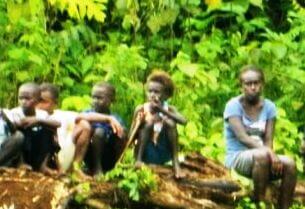As is common across all Pacific island countries, the village of Rarumana is no exception when it comes to the effects and impacts of climate change.
Everyday rising sea water levels make their presence known. Coral bleaching and shoreline erosion are increasingly visible. The results of climate change are prominent, and yet ‘climate change’ has no term in the local dialect – villagers cannot put words to what is happening everyday to their beautiful islands.
And so Rarumana villagers are asking themselves this question: “What can we as a community do to counter the impacts and effects of climate change?”
At a recent community gathering Tagolyn Kabekabe, the Anglican Alliance’s facilitator in the Pacific, brought locals together to talk about the changing climate and how they could work together to tackle it.
Tagolyn first asked the villagers to define ‘climate change’ and to give it words in their own language. One member of the group related it to changing weather patterns, and another said that it was to do with logging that is affecting the land and environment. There was a question regarding the destruction of crops and whether this was related to climate change.
A basic definition of climate change was discussed, which then enabled the villagers to think of some of the impacts and effects that this had on their home and livelihoods.
One such struggle was repeated by most of the community: “It is getting harder and harder to catch fish close to home. In the past one did not have to go far to catch fish – we used to be able to catch lots of it closer to home.”
Another fear the islanders have is the prominent shoreline erosion and sea-level rise. Many people, in some cases the whole village, have had to relocate to higher grounds as sea water continues to rise.
The fruitful discussions resulted in some key action points that villagers will now take to tackle the effects of climate change. They include
- Planting of mangroves along the shore line to counter erosion
- Filling gabion cages with rocks and stones to protect the shorelines
- Build seawalls using local and natural materials
- Do not remove plants a long beaches and waterfronts
- Plant locally and weather sustainable plants to protect shore lines
- Planting of corals in reefs where corals have died to bring back fish stock
- Closing certain parts of the reefs for periods up to six months to improve fish and shellfish stock
- Certain fishing methods not to be allowed, especially those that kill fish of all shapes and sizes.
- Identify plant crops that sustain and withstand extreme weather conditions
- Learn different methods of food preservation for foods in all seasons.
As locals learn how best to deal with the life-threatening impacts of climate change, the Alliance are preparing to take their voices to the top twenty richest nations in June this year.
The C20 summit will allow civil society organisations a platform to bring their needs to global leaders. Churches and Anglican agencies will be brought together by the Alliance and represented at the summit in Brisbane, Australia.
In the picture: children from Rarumana village

